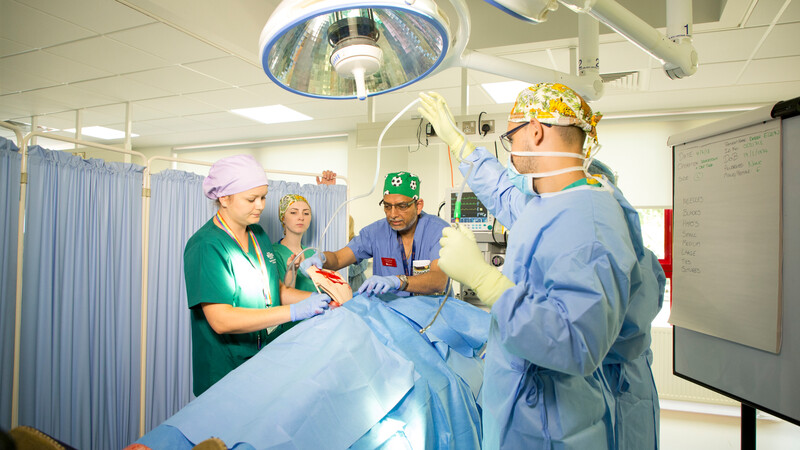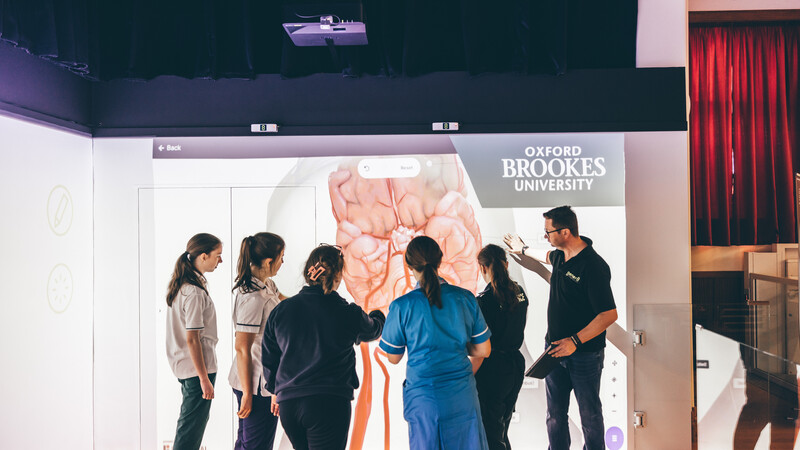Simulation Based Education: Theory, Design and Facilitation module
Credit bearing module
Key facts
Course code
CPD7010
Start dates
January 2025 / September 2025
Application deadline
1 December for a January start
Location
This course is not available to students classed as International for fees purposes.
Overview
This module aims to provide learners with the opportunity to understand and critically examine the fundamental concepts of healthcare simulation using evidence from the literature, and standards for simulation from INACSL and ASPiH organisations. Learners will be supported to plan, develop and facilitate high quality simulation based education (SBE) activities applying relevant educational theories.
Units of study:
- Educational Theory and Simulation Pedagogy
- Designing a Simulation
- Pre-briefing activities
- Facilitating a Simulation
- Debriefing in Simulation

How to apply
Entry requirements
We encourage applicants from a diverse range of roles, with experience in healthcare simulation, or from a healthcare simulation setting to encompass an interprofessional learning ethos.
- Health or social care profession
Or
- Working in healthcare simulation or healthcare setting
Terms and Conditions of Enrolment
When you accept our offer, you agree to the Terms and Conditions of Enrolment. You should therefore read those conditions before accepting the offer.
Application process
Apply via our Moodle portal.
This module can be taken as part of Advanced Clinical Practice (MSC-ACP), Advanced Nursing Practice (MSC-ANP), Advanced Clinical Practitioner Apprenticeship (MSC-ACP-DA).
Tuition fees
Questions about fees?
Contact Student Finance on:
Tuition fees
Fees quoted are for the first year only. If you are studying a course that lasts longer than one year your fees will increase each year.
How and when to pay
Tuition fee instalments for the semester are due by the Monday of week 1 of each semester. Students are not liable for full fees for that semester if they leave before week 4. If the leaving date is after week 4, full fees for the semester are payable.
- For information on payment methods, please see our Make a Payment page.
- For information about refunds, please visit our Refund policy page
Additional costs
Please be aware that some courses will involve some additional costs that are not covered by your fees. Specific additional costs for this course are detailed below.
Optional costs
| Additional costs | Amount (£) |
|---|---|
It’s your responsibility to cover print / binding costs where coursework submission is required. Please note that a lot of the coursework is now submitted online. |
From £30 |
| You may choose to purchase books to support your studies. Many books on our reading lists are available via the Library, or can be purchased secondhand. | £20-60 per book |
Accommodation fees in Brookes Letting (most do not include bills) |
£94-265 per week |
Accommodation fees in university halls (bills included, excluding laundry costs) |
£122-180 per week |
Graduation costs include tickets, gowning and photography. Gowns are not compulsory but typically students do hire robes, starting at £41. |
Typically £0-200 |
Students are responsible for their own travel to and from university for classes. BrookesBus travel is subsidised for full-time undergraduate students that are on a course with a fee of £9,250 or more, or living in an Oxford Brookes hall of residence. There is an administration fee for the production of a BrookesKey. |
From £10 |
Funding your studies
Financial support and scholarships
Featured funding opportunities available for this course.
All financial support and scholarships
Learning and assessment
The module will be delivered using a mixture of seminars, simulation, workshops, online learning activities and discussions via the Moodle platform. All activities will be facilitated by the module team and specialist guest lecturers, whilst also providing the opportunity for interprofessional learning both with, and from peers.

Learning and teaching
Each learning unit will focus on an aspect of simulation-based education, from the theory to the design, to facilitation. Learners will be provided with the opportunity to read, review and critique the processes involved in designing, organising, facilitating and evaluating simulation activities. The learners' development will be evidenced through the use of a digital portfolio, demonstrating their journey in achieving the module learning outcomes. Delivery will utilise a variety of teaching and learning activities e.g.
- Seminars
- Group discussion and debate
- Online learning
- Workshops
Learners will use self reflection within a lively, challenging and supportive learning environment enabling them to share knowledge and relevant practice experiences.
Assessment
Assessment methods used on this course
Assessment methods used on this course:
- A digital portfolio demonstrating the learning journey
- A critical reflection
The assessment for this module is central to the curriculum and the learning and teaching strategies. It is designed to demonstrate evidence of learning, consistent with the identified learning outcomes. Learners will be formatively assessed within the module allowing them to experience the assessment process prior to summative assessment. This offers an opportunity for learners to receive supportive, timely and constructive feedback on their performance. Dialogue is encouraged to involve the learner throughout this process.
Programme changes:
On rare occasions we may need to make changes to our course programmes after they have been
published on the website. For more information, please visit our
changes to programmes page.
